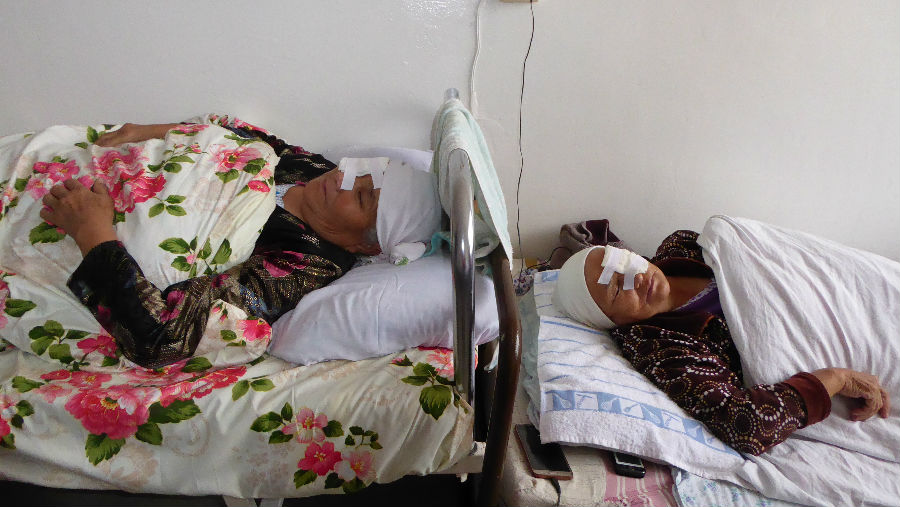Join a powerful, unprecedented alliance for better eye health for all.
Join IAPB-
Choose an alternate language here
Carmen Steimann, Swiss Red Cross on their eye care programme in Kyrgyzstan.
 Poverty can be one of the causes of blindness, as it is one of the barriers in accessing care. We at the Swiss Red Cross (SRC) are working in various countries to break this vicious circle.
Poverty can be one of the causes of blindness, as it is one of the barriers in accessing care. We at the Swiss Red Cross (SRC) are working in various countries to break this vicious circle.
In 2016, we launched an eye care programme in Kyrgyzstan, that uses an integrated approach, in close collaboration with the Ministry of Health. Working with the Red Crescent Society of Kyrgyzstan, we are also involved in implementing several other developmental projects, in primary healthcare and healthy ageing to blood safety and disaster preparedness etc.
Our interest in Kyrgyzstan was initiated by a Kyrgyz national ophthalmologist working in Switzerland that made us aware of the great need for eye care in the Batken region in the South of Kyrgyzstan in 2014. Following elaborate assessment and planning, our project was launched in 2016.
The assessment revealed many challenges. To name a few: over 50% of the population in Batken lives below the poverty line. The region is also home to an ageing population, which necessitates a greater need for eye care services. In addition, more than 70% of the population lives in rural areas, which means they need to travel long distances to access medical care in general and eye care in particular.
In Batken, people with eye disorders had to travel up to 1000 kilometres to obtain adequate treatment. The cost required: for travel, accommodation and treatment were prohibitive for the majority of the population. Although the region had 44 ophthalmologists per million population, only a few were equipped to operate and the cataract surgical outcomes were below WHO standards.
The most common cause of blindness was found to be cataract, accounting for 43% of avoidable blindness. This was followed by glaucoma blindness accounting for 30%, which is among the highest worldwide. This figure also demonstrates the gaps that existed at all levels of the eye care system here: starting from disease prevention, early diagnosis to getting adequate treatment.
Thanks to the SRC eye care programme, the situation has already started to improve for the 450,000 inhabitants of the Batken region. Brigitte Müller, the SRC programme coordinator for Kyrgyzstan, explains: “The Batken city clinic now has a fully functional eye care unit where outpatients receive proper treatment and operations are performed.”
For the Kyrgyz Red Crescent Society, the SRC’s local implementing partner, eye care was a new territory and the SRC’s expertise was appreciated. “The aim of the second project phase is to support the Ministry of Health to develop an eye care strategy for the country and to improve the eye care system at all levels of the health care system by the end of the project phase 2021,” says Müller.
The planning and monitoring of the project is based on solid data from the RAAB (rapid assessment of avoidable blindness) study carried out as part of the SRC project in the South of the country. While the project addresses shortcomings identified in the South, a second RAAB study will be conducted in the North. Once the results are available, international experts will support the Ministry of Health to develop an eye health strategy for the entire country.
The RAAB study showed that 85% of blindness in Kyrgyzstan is avoidable. To raise awareness among the population and enhance early diagnosis of eye conditions, the SRC is working to improve health literacy amongst the general public. We are also working to strengthen the referral system starting from family doctors to the family medical centres to the hospitals. “The high prevalence of glaucoma blindness identified in the RAAB study is just “the peak of the iceberg”. The findings show that many people have early stages of glaucoma that are untreated as people are not aware that this will result in blindness. “We need to invest more in information campaigns and health promotion among those living in remote areas so that people understand the need for getting diagnosed and treated as early as possible,” says Brigitte Müller.
The RAAB study, which has also attracted the interest of the WHO and the International Agency for the Prevention of Blindness (IAPB), lays the foundation for a nationwide eye care strategy and has encouraged the Kyrgyz government to commit to improve eye care services in the country. Brigitte Müller is convinced that Kyrgyzstan has a good chance to reduce avoidable blindness in the future: “The programme will strengthen the local healthcare system as a whole and will link up eye care professionals throughout the country to work together towards a common goal.”
(Picture credit) Switzerland has launched an eye care programme in Kyrgyzstan. © SRC